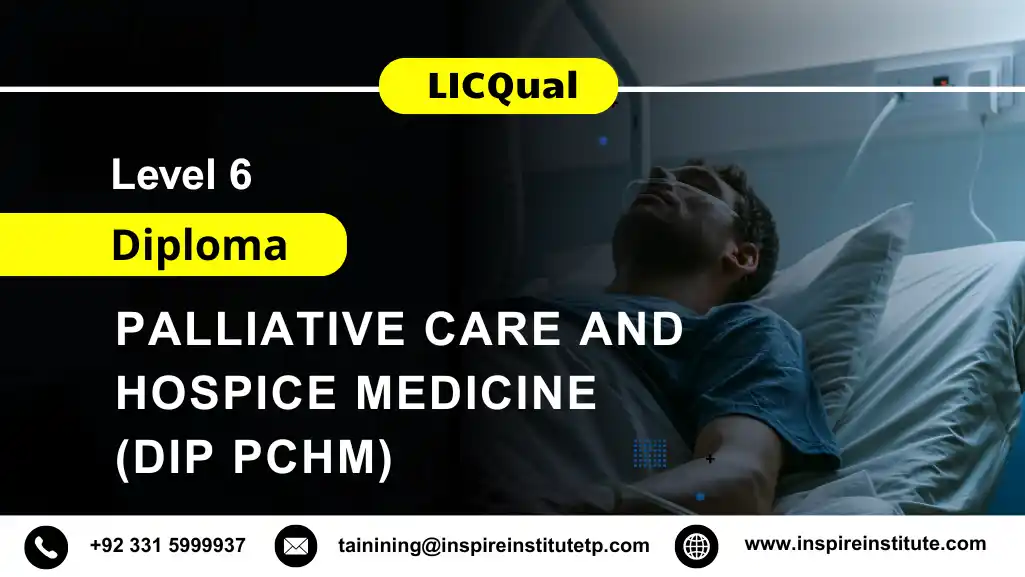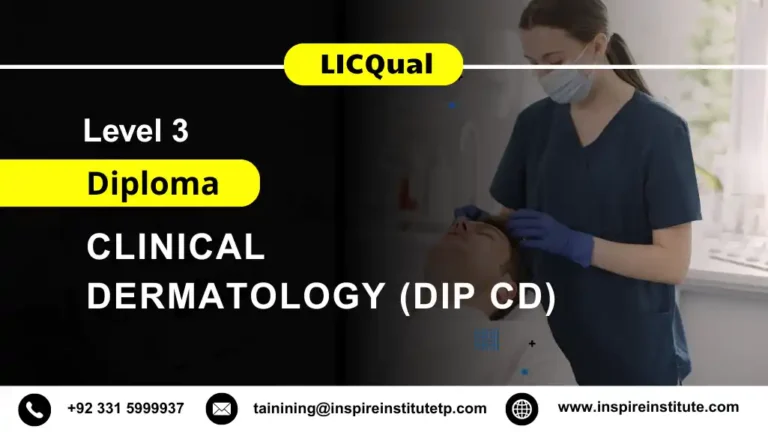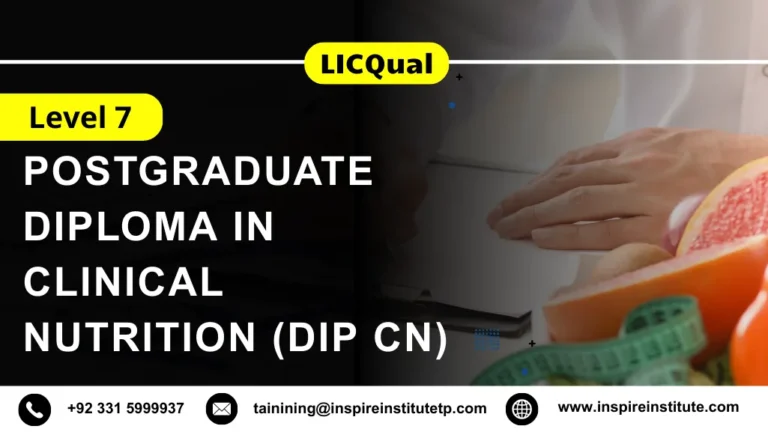LICQual Level 6 Diploma in Palliative Care and Hospice Medicine (Dip PCHM)
The LICQual Level 6 Diploma in Palliative Care and Hospice Medicine (Dip PCHM) is a UK-accredited qualification designed to prepare healthcare professionals for advanced practice in palliative and end-of-life care. This comprehensive diploma focuses on improving the quality of life for patients with life-limiting illnesses, emphasizing compassion, clinical excellence, and evidence-based practice in palliative medicine. It aims to enhance the professional competencies of doctors, nurses, and allied health professionals committed to providing holistic, patient-centred care in hospice and palliative care settings.
The course provides an in-depth understanding of the principles of palliative care, pain management, symptom control, psychosocial support, and ethical decision-making in end-of-life care. Learners develop the ability to integrate medical, emotional, and spiritual dimensions into patient management, fostering a compassionate approach that aligns with international standards in palliative and hospice medicine.
The LICQual Diploma in Palliative Care and Hospice Medicine ensures that learners are capable of applying research-informed strategies to improve symptom management, family counselling, and palliative interventions. This approach helps healthcare providers make critical clinical decisions while maintaining empathy and compassion.
The LICQual Level 6 Diploma in Palliative Care and Hospice Medicine (Dip PCHM), learners become proficient in managing complex palliative cases, delivering high-quality end-of-life care, and contributing to the continuous development of global healthcare standards in hospice medicine. This diploma empowers professionals to make a lasting impact in the lives of patients and their families through compassion, knowledge, and clinical excellence.
Why Choose this Qualification
The LICQual Level 6 Diploma in Palliative Care and Hospice Medicine (Dip PCHM) is a prestigious UK-accredited qualification designed for healthcare professionals who aspire to deliver compassionate, evidence-based, and patient-centred care to individuals facing life-limiting illnesses. This advanced diploma blends theory and clinical practice, equipping learners with the knowledge, skills, and ethical understanding required to provide quality end-of-life and hospice care. It focuses on developing the expertise needed to manage pain, symptoms, and psychosocial challenges while maintaining the dignity and comfort of patients and their families.
Key Reasons to Choose this Qualification
1. Comprehensive Understanding of Palliative Care Principles
- Gain in-depth knowledge of pain management, symptom control, and end-of-life care.
- Learn to integrate physical, emotional, social, and spiritual aspects of palliative medicine.
- Understand the ethical and legal frameworks governing hospice and palliative care.
- Acquire the ability to assess complex patient needs and develop holistic care plans.
- Build competence in multidisciplinary collaboration for effective patient management.
2. Evidence-Based Clinical Practice
- Apply the latest research and best practices in palliative and hospice medicine.
- Develop critical thinking skills to evaluate medical literature and clinical guidelines.
- Enhance decision-making abilities through case studies and real-world scenarios.
- Implement outcome-based approaches that improve patient care and satisfaction.
- Stay updated with innovations in pain management and palliative therapies.
3. Leadership and Professional Development
- Strengthen leadership and team management skills within palliative care settings.
- Learn to coordinate interdisciplinary care involving doctors, nurses, and counsellors.
- Build confidence in leading palliative projects and implementing quality improvements.
- Cultivate empathy-driven leadership for compassionate patient support.
- Prepare for supervisory and consultancy roles in healthcare institutions.
4. Enhanced Patient-Centred Communication
- Master effective communication with patients, families, and care teams.
- Develop strategies for delivering difficult news with sensitivity and compassion.
- Learn culturally competent approaches to patient and family interactions.
- Gain skills in counselling and emotional support for end-of-life care.
- Strengthen trust-based relationships that enhance patient and family satisfaction.
5. Global Recognition and Career Advancement
- Earn an internationally recognised UK qualification in palliative medicine.
- Enhance employability across hospitals, hospices, and community care settings.
- Open pathways to advanced clinical or academic roles in healthcare.
- Strengthen credentials for international healthcare practice and leadership.
- Join a network of qualified professionals committed to global palliative excellence.
6. Flexible and Accessible Learning Format
- Benefit from an assignment-based study model designed for working professionals.
- Access structured online resources and mentor-led academic guidance.
- Study at your own pace without interrupting your professional commitments.
- Engage with practical assignments that connect theory to real-world practice.
- Experience a learner-centred approach fostering continuous professional growth.
7. Ethical and Compassionate Practice Development
- Understand ethical dilemmas and decision-making in end-of-life care.
- Learn to uphold patient autonomy, dignity, and informed consent.
- Apply compassionate care principles to alleviate suffering and enhance comfort.
- Foster emotional resilience and self-care for sustainable practice.
- Promote humanistic and respectful treatment of patients and families.
8. Contribution to Healthcare Innovation and Quality Improvement
- Participate in research-based assignments to improve clinical practice.
- Learn quality improvement methods for palliative care programmes.
- Contribute to healthcare systems through policy development and education.
- Integrate sustainability and equity into palliative service delivery.
- Inspire continuous improvement within multidisciplinary healthcare environments.
The LICQual Level 6 Diploma in Palliative Care and Hospice Medicine (Dip PCHM) is an investment in both professional excellence and compassionate service. This qualification empowers healthcare practitioners to make a meaningful difference in the lives of patients and families by combining advanced medical knowledge with empathy, ethics, and leadership. It is the ideal pathway for those who aspire to shape the future of global palliative care and uphold the highest standards of end-of-life practice.ield of urology. It offers a measurable impact on professional development, clinical competence, and healthcare excellence globally.
Course Overview
LICQual UK Awarding Body
Average Completion Time:
6-24 Months
Study Units: 6 Units
Evidence & Assignment Based
Mandatory Units
Who Should Take This Course
The LICQual Level 6 Diploma in Palliative Care and Hospice Medicine (Dip PCHM) is a comprehensive UK-accredited qualification developed for healthcare professionals committed to improving the quality of life for patients with life-limiting or terminal illnesses. This advanced diploma is ideal for individuals seeking to deepen their knowledge, clinical competence, and compassionate care approach in palliative and hospice settings. It combines theoretical depth with practical relevance, preparing learners to deliver holistic, evidence-based, and patient-centred care in hospitals, hospices, and community health environments.
This course is suitable for
1. Medical Practitioners and Physicians
- Designed for doctors who aim to specialise in palliative medicine and hospice care.
- Learn to manage complex pain, symptoms, and end-of-life decisions effectively.
- Gain the skills to lead multidisciplinary teams in hospital and home-care environments.
- Develop clinical judgment grounded in ethical and evidence-based practice.
- Enhance patient communication and empathy-driven care delivery.
2. Registered Nurses and Clinical Care Specialists
- Ideal for nurses providing end-of-life and long-term care across healthcare settings.
- Strengthen competence in symptom management, emotional support, and patient advocacy.
- Learn to design and implement holistic care plans addressing physical and emotional needs.
- Develop leadership skills to coordinate hospice and palliative care units.
- Improve confidence in handling sensitive conversations with patients and families.
3. Allied Health Professionals
- Suitable for physiotherapists, occupational therapists, and dietitians in palliative care.
- Gain insight into interprofessional collaboration for enhanced patient wellbeing.
- Learn rehabilitation and supportive care strategies for terminal conditions.
- Understand the psychosocial dynamics of patients with chronic and terminal illnesses.
- Apply patient-centred interventions that promote comfort and dignity.
4. Healthcare Administrators and Managers
- Designed for healthcare leaders overseeing palliative and hospice programmes.
- Learn to implement policies aligned with ethical, clinical, and organisational standards.
- Develop strategies for improving quality and efficiency in end-of-life care delivery.
- Understand financial and operational management within hospice settings.
- Build leadership capacity for supporting interdisciplinary healthcare teams.
5. Psychologists and Counsellors
- Ideal for mental health professionals working with terminally ill patients and families.
- Learn to address grief, anxiety, and emotional distress associated with terminal illness.
- Gain expertise in counselling and therapeutic interventions for palliative environments.
- Develop strategies to support healthcare staff experiencing compassion fatigue.
- Enhance cultural sensitivity and empathy in delivering psychological care.
6. Social Workers and Community Health Practitioners
- Suitable for professionals providing home-based or community palliative care.
- Learn to advocate for patient rights, access to care, and emotional support systems.
- Develop skills to coordinate between families, healthcare providers, and social services.
- Gain insights into public health strategies for community-based hospice programmes.
- Apply inclusive care approaches to support diverse patient populations.
7. Academic and Clinical Educators
- Designed for educators involved in training healthcare professionals in palliative care.
- Gain advanced theoretical and practical understanding to enhance teaching quality.
- Learn to integrate case-based and evidence-based learning in curriculum design.
- Contribute to research, policy development, and healthcare education reform.
- Strengthen mentorship skills for guiding learners in clinical compassion and ethics.
8. Professionals Seeking Career Transition into Palliative Care
- Perfect for healthcare practitioners aspiring to shift into hospice or end-of-life care.
- Learn foundational and advanced palliative care principles adaptable to various settings.
- Develop competence in patient assessment, communication, and care coordination.
- Gain internationally recognised credentials to enhance employability in healthcare.
- Build confidence to contribute meaningfully to improving global palliative services.
The LICQual Level 6 Diploma in Palliative Care and Hospice Medicine (Dip PCHM) serves as a transformative pathway for professionals dedicated to compassionate healthcare. Whether you are a clinician, manager, educator, or allied health worker, this qualification empowers you to provide ethical, patient-centred, and high-quality care to individuals at the most critical stages of life. It strengthens professional growth while ensuring lasting impact in the field of palliative and hospice medicine globally.
Course Benefits
The LICQual Level 6 Diploma in Palliative Care and Hospice Medicine (Dip PCHM) is a UK-accredited qualification designed for healthcare professionals, palliative care practitioners, and medical leaders seeking to advance their expertise in providing compassionate, ethical, and evidence-based end-of-life care. This assignment-based diploma combines theoretical knowledge with practical application, enabling learners to assess, plan, implement, and evaluate palliative care strategies effectively. Through flexible study pathways and evidence-based learning, this qualification equips professionals to enhance patient comfort, support families, and contribute to advancements in hospice and palliative care practice.
Key Benefits of the Course
Specialist Knowledge
- Gain comprehensive understanding of palliative care principles, hospice medicine, symptom management, pain control, psychological support, end-of-life ethics, holistic care, chronic illness management, and pharmacological interventions, empowering learners to deliver dignified and compassionate care to patients and families.
Practical Application
- Develop real-world skills through case studies, clinical simulations, reflective assignments, patient assessment, care planning, personalised treatment delivery, multidisciplinary collaboration, and communication strategies that prepare professionals to handle complex end-of-life scenarios effectively.
Recognised Qualification
- Earn a prestigious UK-accredited Diploma in Palliative Care and Hospice Medicine (Dip PCHM) that validates your clinical expertise, ethical practice, and professional competence. This internationally recognised qualification enhances credibility and opens career opportunities across hospitals, hospices, care homes, academic institutions, and global health organisations.
Flexible Learning Pathway
- Experience assignment-based, self-paced study with access to digital resources, structured guidance, personal mentorship, online learning platforms, and adaptable schedules, allowing learners to balance career responsibilities with academic advancement efficiently.
Evidence-Based Training
- Engage with latest research, clinical guidelines, and innovative practices in palliative care. The course develops learners’ ability to critically evaluate scientific evidence and implement validated strategies in pain management, emotional support, and ethical decision-making to improve patient quality of life.
Career Development
- Enhance professional opportunities through roles such as Palliative Care Specialist, Hospice Physician, Clinical Coordinator, Educator, Researcher, or pursue postgraduate studies. Graduates gain the expertise to assume leadership positions in palliative and hospice care across healthcare environments.
Enhanced Patient Impact
- Master ethical, empathetic, culturally sensitive, patient-centred care with emphasis on comfort, dignity, symptom relief, family support, and holistic wellbeing, ensuring graduates positively influence the quality of life for patients and their families in critical health stages.
Professional Growth
- Strengthen leadership, clinical reasoning, critical thinking, communication, emotional resilience, reflective learning, and interdisciplinary collaboration, enabling graduates to innovate, advocate, and lead in palliative care practice globally.
The LICQual Level 6 Diploma in Palliative Care and Hospice Medicine (Dip PCHM) empowers healthcare professionals to become leaders in palliative care by providing advanced knowledge, practical expertise, and internationally recognised credentials. It enhances career prospects while improving patient outcomes and advancing the standards of hospice and end-of-life care worldwide.
Eligibility Criteria
The LICQual Level 6 Diploma in Palliative Care and Hospice Medicine (Dip PCHM) is a UK-accredited qualification designed for healthcare professionals, palliative care practitioners, and aspiring medical leaders who aim to enhance their expertise in end-of-life care, symptom management, and holistic patient support. This assignment-based diploma integrates theoretical knowledge with practical applications, preparing learners to assess, plan, implement, and evaluate palliative care programs and hospice services effectively.
Educational Background:
Applicants should hold a recognised qualification in medicine, nursing, healthcare, or a related palliative care or clinical field. A Level 5 diploma or equivalent qualification in healthcare management, clinical sciences, or related disciplines may also be accepted. Candidates with international degrees in medicine, nursing, or allied health disciplines will be evaluated individually to determine eligibility and equivalence to UK standards.
Professional Experience:
A minimum of one year of experience in healthcare, clinical practice, palliative care, or a related medical field is recommended. Previous exposure to patient care, end-of-life support, or clinical assessment provides an advantage. Motivated applicants with a strong interest in palliative care, hospice medicine, or patient management, even without direct professional experience, are encouraged to apply.
Age Requirement:
Applicants must be at least 18 years old at the time of enrolment. This ensures that learners possess the maturity, ethical understanding, and professional responsibility required for advanced study and practical application in palliative and hospice care.
Language Proficiency:
As the programme is delivered entirely in English, learners must demonstrate proficiency in reading, writing, and communication. A minimum IELTS score of 6.0 or an equivalent qualification is recommended for non-native English speakers to ensure effective participation in assignments, discussions, and assessments.
Technical Requirements:
Learners should have access to a computer or laptop with a reliable internet connection to participate in online learning, access study materials, and submit assignments. Basic computer literacy, including proficiency in research, data analysis, document preparation, and communication tools, is essential for academic success in this programme.
Required Documents:
Applicants are required to submit the following documents during registration:
A valid ID card or passport for identity verification.
Academic transcripts or certificates of previous qualifications.
Proof of professional experience in healthcare, clinical practice, or palliative care (if applicable).
The Qualification Process
LICQual Level 6 Diploma in Palliative Care and Hospice Medicine (Dip PCHM) follows a structured pathway to ensure learners gain comprehensive knowledge, practical skills, and professional competence in community oral healthcare.
Step 1: Self-Assessment
Learners review the entry requirements to confirm eligibility. Candidates with a background in dentistry, oral health, or public health are encouraged to apply.
Step 2: Registration
Complete the registration process by submitting required documents such as proof of qualifications, a valid ID, and payment of enrollment fees.
Step 3: Induction
An induction session is conducted to:
- Verify learner eligibility and documentation.
- Introduce study materials, learning outcomes, and assessment procedures.
Step 4: Learning and Evidence Submission
Learners complete assignments, case studies, and practical exercises demonstrating competence in public health dentistry, community oral health assessment, preventive strategies, and program planning.
Step 5: Feedback and Revision
Assessors review submitted evidence and provide constructive feedback. Learners can revise and resubmit work to meet all required standards.
Step 6: Competence Validation
Final submissions are evaluated to confirm that learners have met all theoretical and practical learning outcomes.
Step 7: Internal Quality Assurance (IQA)
The IQA team reviews the assessment process to ensure accuracy, fairness, and compliance with international standards.
Step 8: External Verification (EQA)
External verifiers validate the authenticity and quality of learner achievements.
Step 9: Certification
Upon successful verification, learners are awarded LICQual Level 6 Diploma in Palliative Care and Hospice Medicine (Dip PCHM), demonstrating advanced proficiency in community oral healthcare and preparing them for professional growth in dental public health, preventive dentistry, and healthcare policy.







